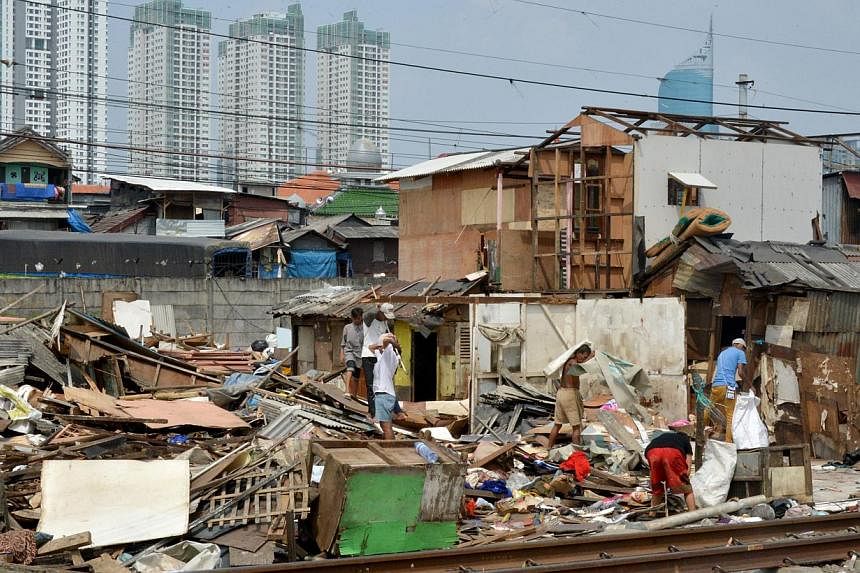One of President Joko Widodo's biggest challenges is to provide affordable homes for the thousands of disenfranchised and unbankable Indonesians who supported him.
Having succeeded in ending fuel subsidies late last year, yielding a windfall of some US$20 billion to US$25 billion (S$27 billion to S$34 billion) in savings in the Budget, he now has more resources than his predecessors to serve those who, like him as a young man from a simple background in Surakarta, face evictions and financial stress in their search for decent housing.
Indonesia's housing sector is in an intractable state of crisis. There are more than twice as many people in need of basic housing in Indonesia - more than 50 million - than the entire population of neighbouring Australia - 23 million. Across its vast archipelago, though mostly concentrated on Java, the country faces a backlog of 15 million housing units, a figure which grows by some 400,000-600,000 unitsa year.
Indonesia's government has failed in multiple attempts to provide housing for its vast low-income population, due to a lethal combination of market primacy, weak enforcement of laws and administrative gridlock between the central and local authorities.
Private developers have, however, managed to build 180 shopping malls in Jakarta, reducing green space from 35 per cent in 1983 to only about 6 per cent today - and yet, many of these public places are off-limits to all but the very wealthy.
Kampungs amid skyscrapers
A process of decentralisation, starting in 1999, greatly reduced the central government's potency. Local regencies, or kabupatens, assumed greater administrative powers, but without adequate capacity for governance and coordination.
One result has been a messy system where certain lands are formally registered at the national level and others are held informally by land title at the local level. This has led, for example, to the schizophrenic skyline of Jakarta, characterised by shiny skyscrapers and "superblocks" amid a sea of traditional villages, or kampungs.
Starting in 2005, the government launched the "1000 Towers" plan for accommodating low-income residents in high density buildings. This scheme failed when developers took advantage of cheap land to build condos for the rich instead. In 2010, a programme was launched to provide subsidised mortgages for those earning less than 4,000,000 rupiah (S$440).
This, however, has not met the needs of informal workers, who make up more than 50 per cent of the workforce and who cannot access the subsidies.
Developers are required by law to build three units of affordable housing for every luxury home built. Yet enforcement is weak and profits from high-end developments easily compensate for non-compliance penalties. What can President Jokowi's administration do to address this problem?
Firstly, economic incentives should be created to motivate private developers to build affordable units profitably and with less headache.
This can be achieved by requiring a levy on sales of mid-range and luxury housing units, a portion of which can then be returned back to developers as a tax credit for those who build affordable homes. Such a rebate offers greater margin on affordable houses, overcoming a key barrier within the current business model.
Fund to attract the likes of Temasek
If all sales of properties above US$50,000, both new and for resale, were taxed an additional 2 per cent, that would immediately yield nearly US$500 million with which to address low-income housing needs, perhaps through a low-income housing fund. Such a fund would be a natural destination for seed capital from President Jokowi's Budget savings and, importantly, could be opened to regional investors like Singapore's Temasek Holdings, Malaysia's Khazanah Nasional and others.
A portion of the levy could fund the tax credit, eliminating the need for government subsidies. Another portion could be channelled via the fund to a "Housing Authority", an independent commercial entity structured as a public-private partnership to support the execution of affordable housing development. Local government, a necessary partner, can serve to identify and allocate land more efficiently, reducing the time and costs currently borne by developers.
The authority could streamline the permitting process, set conditions on developments - for example, mandating and overseeing the profiles of buyers, thus ensuring the units remain affordable - set limits on the resale of properties to curb speculative price increases and draft and enact guidelines for the design and maintenance of structures.
New "rent-to-own" models for low-income consumers should be considered which will be more inclusive than current mortgage subsidy schemes. Such unbankable consumers can build equity slowly over time.
President Jokowi has the resources, popular support and perhaps even the political will to lead a new effort towards providing affordable housing for the masses. His successful implementation of new ideas to overcome this daunting but fundamental challenge for the country can be the realisation of what many in Indonesia and, indeed, around the Asia region are hoping from this first president of the people.
The writer is managing director of Global Institute For Tomorrow, a think-tank.

